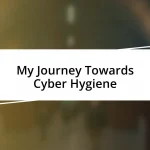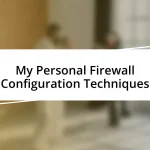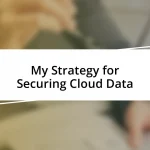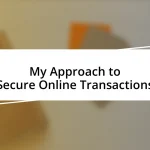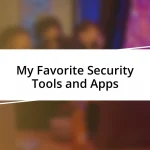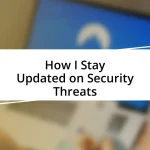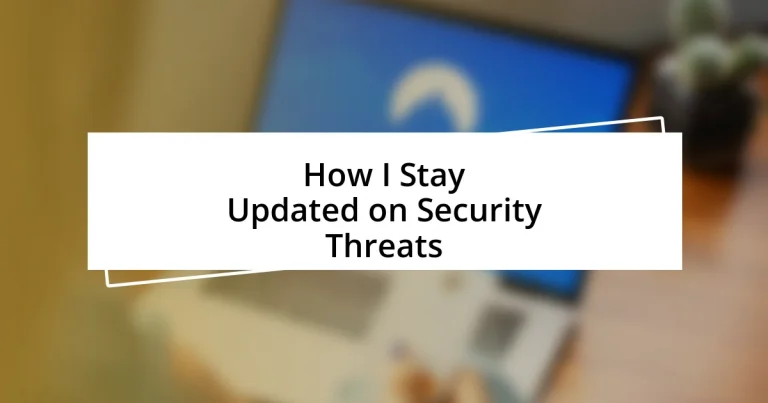Key takeaways:
- Identifying reliable security sources involves following reputable organizations, industry blogs, and engaging in online communities to contextualize information.
- Subscribing to informative security newsletters enhances awareness of emerging threats and provides actionable insights through analytical perspectives.
- Attending webinars and participating in online security forums fosters continuous learning, networking opportunities, and a supportive community for sharing real-world experiences and knowledge.
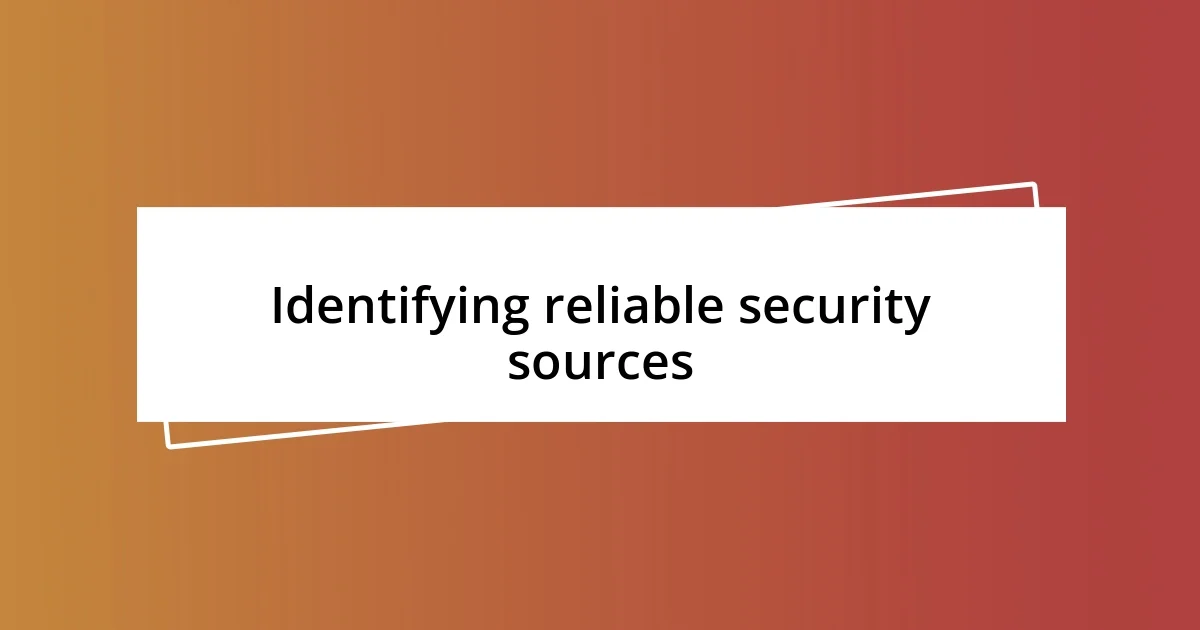
Identifying reliable security sources
When I first dove into the world of cybersecurity, finding reliable sources felt daunting. It’s easy to come across sensational headlines that ignite fear rather than inform. I learned to trust reputable organizations like the Cybersecurity & Infrastructure Security Agency (CISA) and well-known experts like Bruce Schneier. Their detailed analyses and practical advice make navigating the complex landscape of security threats much clearer.
One of my go-to strategies is following reputable industry blogs and podcasts. I remember a particular podcast episode where a leading expert unpacked the latest ransomware trends. It wasn’t just about the facts; the discussion resonated deeply with me, shedding light on real-world applications and consequences. Aren’t we all looking for that blend of expertise and relatability? This combination is vital in identifying reliable sources that not only report facts but also contextualize them in a way we can understand.
Finally, joining online security communities has transformed how I identify trustworthy information. Platforms like Reddit and specialized forums allow professionals and enthusiasts alike to share their experiences. I’ve found that being part of these discussions not only keeps me updated but also helps me gauge the credibility of different sources based on recommendations and personal stories. Do you ever find that peer recommendations offer grounding in a sea of information? I certainly do.

Subscribing to security newsletters
Subscribing to security newsletters has become an essential part of my routine in staying informed about the latest threats. I recall the first time I received a newsletter from a well-regarded security firm. The insights they provided on emerging malware types were not only timely but also actionable. It felt like having a trusted advisor in my inbox every week, equipping me with the knowledge to better protect myself and those around me.
While many newsletters simply present news, I particularly appreciate those that offer analytical perspectives on security events. For instance, a newsletter I subscribe to often breaks down recent breaches, detailing how they occurred and the lessons to be learned. Those deep dives not only inform me about potential vulnerabilities in my own systems but resonate on an emotional level, reminding me of the real individuals impacted behind those headlines. It’s almost like having a personal mentor guiding me through the complexities of the cyber landscape.
When comparing different newsletters, I’ve discovered that their value can vary significantly. Some focus purely on technical jargon, which can be a bit disengaging, while others strive to weave storytelling with statistics. When I see a newsletter that balances professional analysis with relatable narratives, I know I’ve found a gem. Isn’t it refreshing to receive information that feels both informative and engaging? That’s precisely why I carefully choose my subscriptions.
| Newsletter Name | Focus Area |
|---|---|
| Security Weekly | Emerging Threats & Incidents |
| CISO Weekly | Leadership Insights & Best Practices |
| KrebsOnSecurity | Detailed Cyber Threat Analysis |
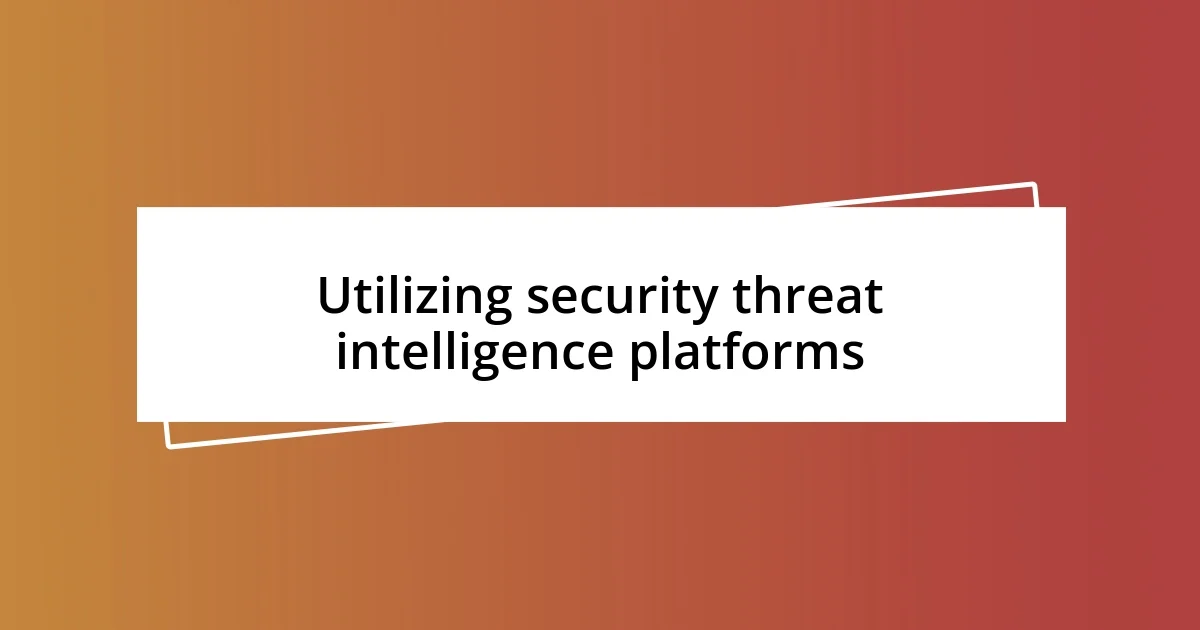
Utilizing security threat intelligence platforms
Utilizing security threat intelligence platforms has been a game-changer for me in terms of staying ahead of potential threats. I remember the first time I accessed a platform like Recorded Future; it felt like opening a treasure chest of information. These platforms aggregate vast amounts of data from various sources, delivering real-time intelligence that’s crucial for informed decision-making. It’s like having a high-tech radar system that helps you navigate the ever-evolving threat landscape.
Here are some advantages I’ve experienced with security threat intelligence platforms:
- Real-time updates: They provide immediate alerts about emerging threats, allowing for quick responses.
- Contextual analysis: The data presented isn’t just raw numbers; it’s often paired with valuable insights that explain the potential impact.
- Customized feeds: Many platforms allow users to tailor the information based on specific interests, which keeps the content relevant.
- Collaboration opportunities: These platforms often include forums or collaboration features where professionals can share insights and strategies.
Using these tools, I’ve felt a sense of empowerment, knowing I can access credible information that helps safeguard my work and personal projects. Instead of wading through endless articles and headlines, I get curated, actionable intelligence that can often feel like a lifeline in an uncertain digital world.
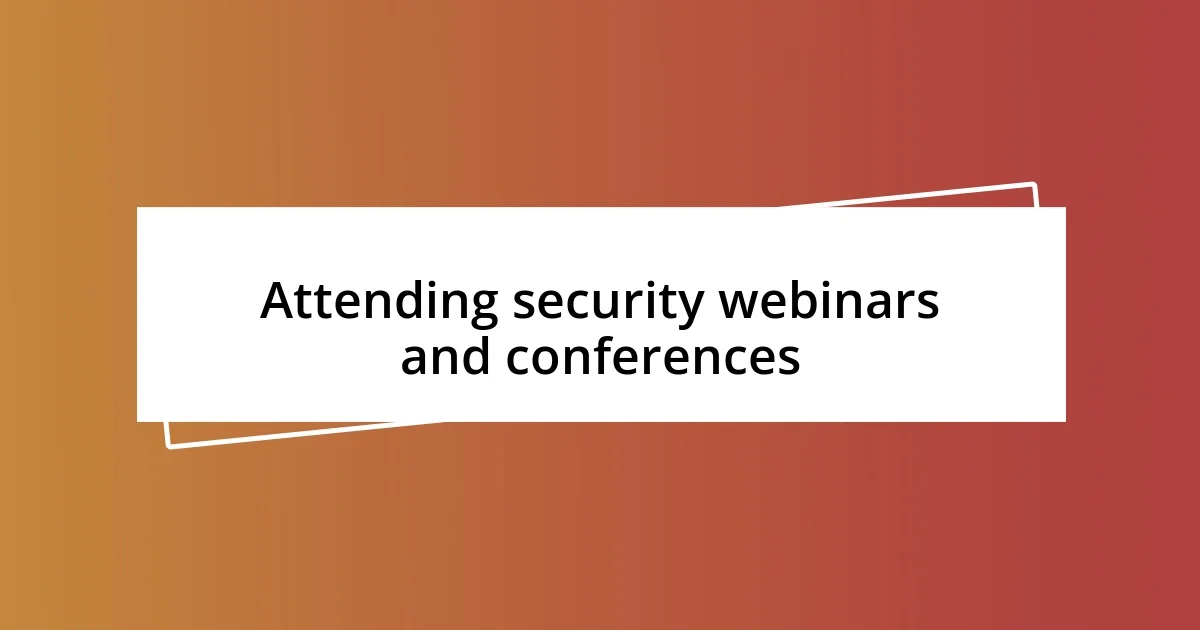
Attending security webinars and conferences
Attending security webinars and conferences has been a crucial element of my ongoing education in this fast-paced field. I vividly remember my first cybersecurity conference; it was an eye-opening experience. I found myself in a room filled with passionate experts passionately sharing their research. The energy was contagious! Each session provided not only valuable knowledge but also practical insights I could apply immediately to enhance my own security practices.
The beauty of these events lies in the diversity of perspectives. For instance, during one memorable webinar on social engineering tactics, I heard a story from a seasoned professional recounting how he was personally targeted by a phishing scam. His candid account reminded me that even the most knowledgeable among us can be vulnerable. It was both humbling and motivating; it reinforced the importance of staying vigilant and continuously learning from others’ experiences.
I often leave these webinars feeling inspired and equipped with new strategies. Networking is another vital aspect; connecting with like-minded individuals opens doors to collaborative opportunities. Have you ever thought about the potential connections you could make at these events? As I chat with fellow attendees, exchanging ideas and discussing recent trends, I feel like I’m part of a larger community committed to making cyberspace safer for everyone. These interactions have helped me form lasting relationships that I truly value.
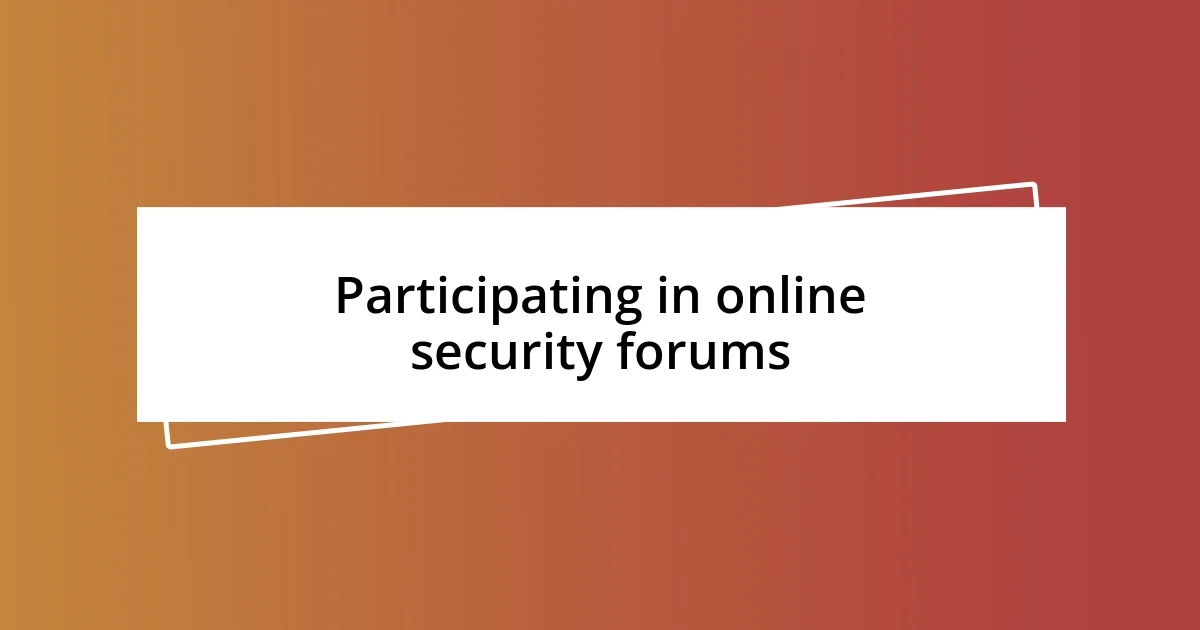
Participating in online security forums
Participating in online security forums has been an enlightening experience for me, as I’ve found valuable insights by engaging with experts and enthusiasts alike. When I first joined a forum dedicated to cybersecurity discussions, I was overwhelmed yet thrilled by the wealth of information shared. Members routinely post about the latest threats and dive deep into their own experiences, which gives me a rich tapestry of real-world knowledge to draw from.
What always strikes me is the camaraderie within these forums. I recall a thread where a newcomer expressed anxiety about a potential data breach in their company. The supportive responses poured in, ranging from technical advice to emotional encouragement, and it reminded me how much we’re all navigating this complex landscape together. Have you ever felt the comfort of belonging to a community when facing uncertainty? I certainly have, and those moments foster a sense of solidarity that is both reassuring and motivating.
As I actively participate in discussions, I often find myself reflecting on the legitimacy of the information shared. It’s easy to get lost in the noise, but the discussions often lead to critical thinking about the methodologies behind various security measures. I appreciate how members don’t just share links to articles but challenge each other’s ideas and propose alternative solutions. This exchange not only refines my understanding but also ignites my curiosity to dig deeper. Isn’t it fascinating how learning can unfold in such an interactive way? I’ve gained not just knowledge, but also friendships with individuals who share the same passion for security as I do.

